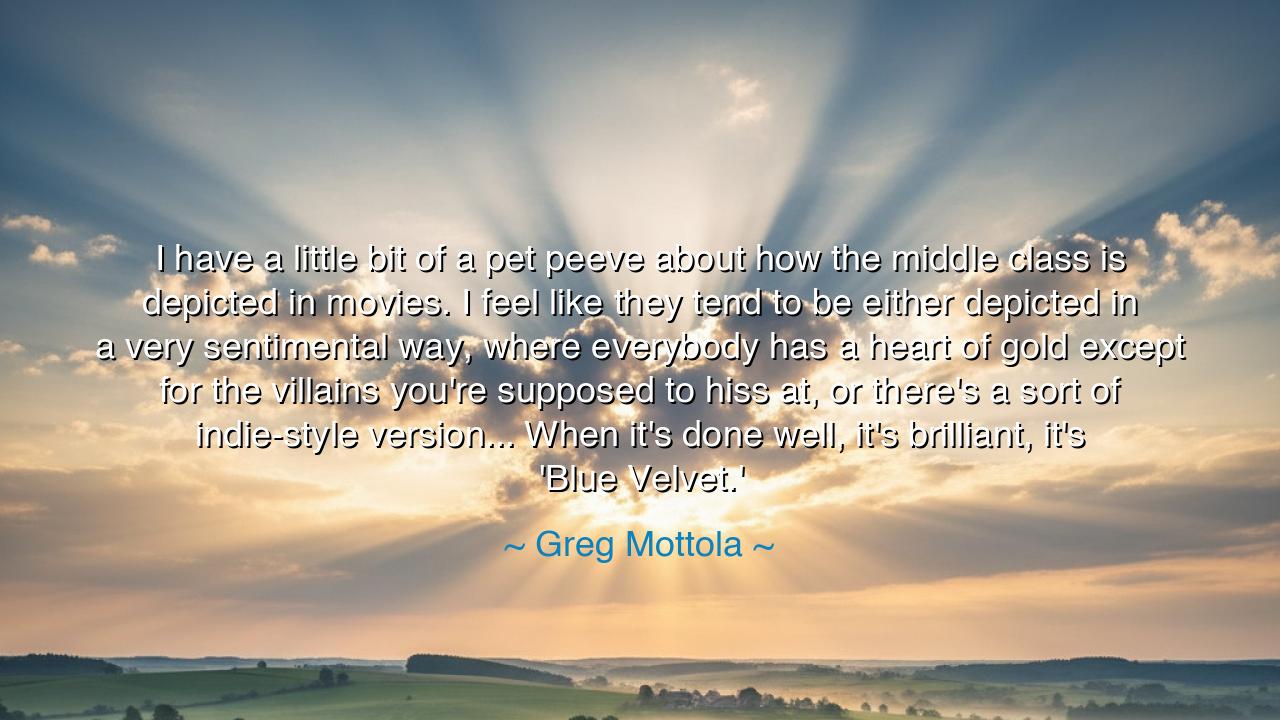
I have a little bit of a pet peeve about how the middle class is
I have a little bit of a pet peeve about how the middle class is depicted in movies. I feel like they tend to be either depicted in a very sentimental way, where everybody has a heart of gold except for the villains you're supposed to hiss at, or there's a sort of indie-style version... When it's done well, it's brilliant, it's 'Blue Velvet.'






In the words of Greg Mottola: “I have a little bit of a pet peeve about how the middle class is depicted in movies. I feel like they tend to be either depicted in a very sentimental way, where everybody has a heart of gold except for the villains you're supposed to hiss at, or there's a sort of indie-style version... When it's done well, it's brilliant, it's Blue Velvet.” Though the words speak of cinema, their truth stretches far beyond the screen. For Mottola speaks not only of film but of the eternal struggle between illusion and reality, between shallow caricature and the deep, sometimes disturbing truth of human existence.
The origin of this frustration lies in the way art often succumbs to comfort. Many films, fearing the discomfort of honesty, portray the middle class as either saintly families wrapped in sentimentality or as ironic figures in quirky, detached tales. Yet this is not life. Life in the middle is far more complex: love mixed with resentment, kindness tangled with cruelty, hope shadowed by despair. By smoothing over these contradictions, cinema betrays its duty. For the task of art is not to flatter but to reveal, not to soothe but to awaken.
Mottola holds up David Lynch’s Blue Velvet as an example of art that dares to do what most fear. In that film, the pleasant surface of suburban America is peeled back, and beneath the manicured lawns and smiling faces, darkness writhes. Here is the truth: that within ordinary lives there are secrets, violence, and longing. Lynch does not destroy the beauty of the middle class, but he refuses to let it exist without its shadows. This is why Mottola calls it brilliant—because it honors the complexity of reality instead of burying it under sentiment or irony.
The ancients, too, grappled with this. Consider the plays of Sophocles or Euripides. They did not present their citizens as paragons of virtue alone, nor as objects of mockery. They revealed the tension in the human heart: Oedipus, both noble king and doomed sinner; Medea, both mother and destroyer. The Greeks knew that art must confront the dark beneath the light, for only then can wisdom be born. To do otherwise would be to lie, and lies, however comforting, lead only to blindness.
History shows us that when societies demand only pleasant depictions of themselves, decline follows. The late Roman Empire, clinging to spectacles of grandeur, turned its eyes away from the corruption rotting its foundations. Only those writers who dared to expose the harsh truth—like Juvenal, with his biting satires—preserved for us a clear vision of what was truly happening. So too in our age, if cinema chooses only sentimentality or shallow irony, it risks becoming a mirror that flatters rather than a lantern that guides.
The deeper meaning of Mottola’s words is this: honesty is the highest duty of art. To reveal both the virtues and the vices of the ordinary life is to respect humanity. To portray only sweetness or only mockery is to diminish it. In truth, the middle class, like all classes, carries within itself the full spectrum of human possibility—love and betrayal, kindness and cruelty, beauty and horror. To honor that reality is to make art not only entertaining but enduring.
The lesson, then, is clear: whether in film, in writing, or in the stories we tell each other daily, let us resist the temptation to oversimplify. See people as they truly are. Do not paint only halos, nor only scars. In your own life, be wary of sentimental illusions that deny reality, and equally wary of cynicism that erases hope. Seek instead the balance of truth, which accepts both light and shadow, for that is where wisdom lies.
Thus Greg Mottola’s words, though framed as a “pet peeve,” become a teaching of the ancients: the duty of the storyteller is to tell the whole truth, even when it is uncomfortable. Only then does art reflect life, and only then can life be seen clearly. For a story without shadow is shallow, but a story that dares to reveal the depths becomes a beacon across generations.






AAdministratorAdministrator
Welcome, honored guests. Please leave a comment, we will respond soon